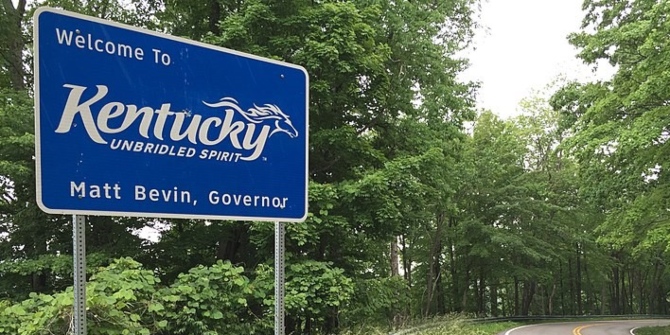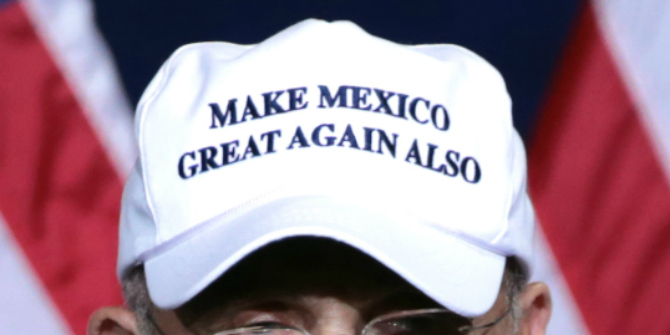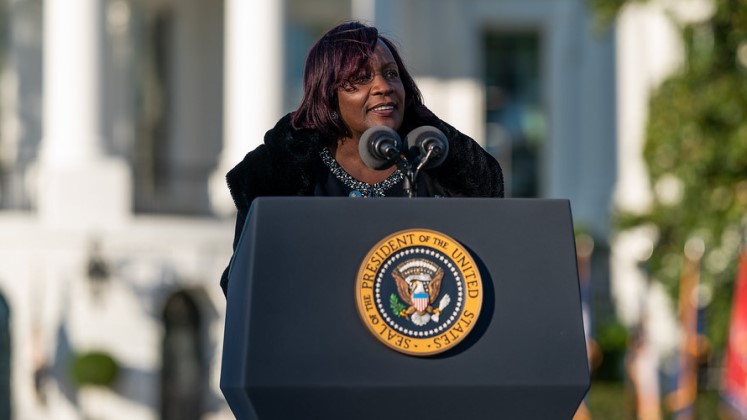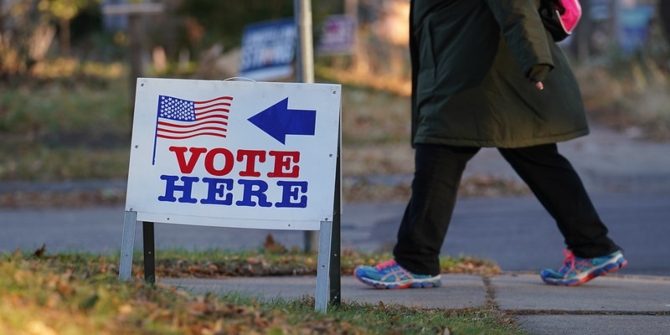 The Iowa Caucuses have finally arrived. This evening, Iowans will take part in caucuses to determine who will jump out to the early lead in the race for the Republican nomination for president. In this Q&A, Thomas Gift analyzes what the caucuses mean for Donald Trump and his two main competitors, Ron DeSantis, and Nikki Haley.
The Iowa Caucuses have finally arrived. This evening, Iowans will take part in caucuses to determine who will jump out to the early lead in the race for the Republican nomination for president. In this Q&A, Thomas Gift analyzes what the caucuses mean for Donald Trump and his two main competitors, Ron DeSantis, and Nikki Haley.
Let’s start by talking about the candidate who, at the start of the campaign season, everyone thought was going to be Trump’s main rival. What does Iowa mean for Florida Governor Ron DeSantis?
I really think it’s do or die for DeSantis in Iowa. He’s staked his campaign on winning the state, and it’s hard to imagine him recovering if he doesn’t have a strong second place finish. Maybe he can outperform in Iowa. But to me, DeSantis’s campaign looks like it’s engaged more in brand management and limiting political fallout than real competition. DeSantis is staring at the same polls as everyone else. He’s at about 16 percent statewide in Iowa, according to 538. He knows that attacking Trump directly has always been futile. He also doesn’t want to totally burn bridges if he has any aims of running for president again. I still think a big question is why DeSantis has failed to resonate with Republican voters. His candidacy was premised on the theory that there was a considerable constituency that wanted a Trump-like candidate, but without the drama. For Republicans, DeSantis seemed to be pressing all the right buttons in Florida: on Covid, on the economy, on the culture wars. It’s easy to forget this is the same candidate who, less than two years ago, won re-election to the governorship of a major swing state by almost 20 percentage points. But it just hasn’t translated into a broader coalition. In the end, it might just come down to personality. Charisma matters, especially in early primary states that prioritize retail politicking.
Is former South Carolina Governor, Nikki Haley, in the same boat?
Haley’s fortunes don’t ride as much on Iowa because she’s really positioned herself to outperform in New Hampshire next week. If she can stay close to Trump there, that could really jolt the race. Haley has a massive ground game in New Hampshire. She also has the backing of popular Republican Governor Chris Sununu. Her biggest asset, though, is independents, who can vote in the New Hampshire primaries unlike in many other states. But the problem for Haley is that she doesn’t want to court these voters too much. With former New Jersey Governor, Chris Christie out of the race, the last thing she wants to be is the “establishment” candidate: the candidate of the elites, the candidate of upscale suburban moderates, or—worst of all— the candidate of the “mainstream media.” She’s already viewed that way to an extent, and it hurts her with the right-wing base. Even if Haley somehow stages a major upset in New Hampshire, it’s an uphill battle. After Nevada, her home state of South Carolina is next. That might seem like an advantage. But South Carolina is Trump Land, and losing her home state could be embarrassing and stunt her momentum. It could be the beginning of the end for Haley, heading into Super Tuesday. That’s when voting starts in some “deep South” states where the MAGA movement is stronger.
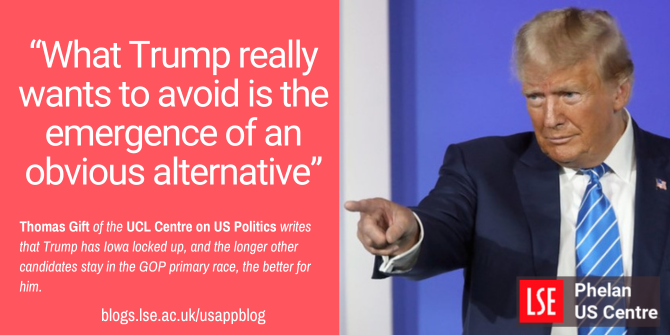
“Donald Trump” (CC BY-SA 2.0) by Gage Skidmore
Are there any pressures on Trump?
I think Trump has the nomination locked up, irrespective of how Iowa turns out. No one in the modern era has taken this big of lead into a contested presidential primary in the modern era, and lost. But part of me thinks it’s important for Trump to win at least 50 percent of the vote in Iowa. Saying he has more than half the Republican electorate has always been Trump’s rationale for not showing up to the debates, and for suggesting that all of the other candidates should call it quits. At the same time, Trump is going to frame Iowa as a thrashing regardless. And if the voting is close, I wouldn’t even be surprised if he suggests that there’s some kind of fraud or vote rigging. The one thing I’ll add is that much of the media is desperate for a horse race. So, if journalists smell any signs of blood coming out of Iowa, that’s going to be the headline. I think if Trump had the choice between winning big, but there being a clear second-place finisher, or winning by less, and having Nikki Haley or Ron DeSantis in a virtual tie, he’d choose the latter. What Trump really wants to avoid is the emergence of an obvious alternative. So, the longer he can keep all the other candidates, including Vivek Ramaswamy in the race, the better for him. His campaign wins when the other candidates split the non-Trump vote.
Against the backdrop of Iowa, Joe Biden’s poll numbers continue to be a concern for the White House. How do you parse his numbers?
There’s no sugarcoating it. Biden is really struggling. Noted conservative pollster Frank Luntz recently said that he thinks Trump may even have a slight edge in the general election. But I also think it’s important to keep a few things in mind. First, Biden’s numbers may just be the “new normal.” In a hyper polarized electorate, maybe expecting approvals much above 40 percent isn’t realistic anymore. We’re not in the same political environment that we were in the 90s, when Bill Clinton hit the 70 percent approval mark after impeachment, or even in the early 2000s, when George W Bush peaked at 90 percent after 9/11. Second, if Trump is the nominee, this race invariably becomes a referendum on him, not Biden. That’s different from a typical incumbent. But it’s the reality because Trump is so polarizing. So, that could make Biden’s polling less crucial than if Haley or DeSantis were the nominee. Finally, I can sympathize somewhat with critics who keep pointing to polling showing that even a “generic Democrat” would beat Trump. But that kind of hypothetical isn’t especially meaningful. There’s no such thing as a generic politician, and everyone is going to have an Achilles heel. So, the polls are definitely concerning for Biden. But they’re not enough to panic, especially 11 months out.
- These remarks are based in part on an interview by Thomas Gift for CNN’s “Newsroom” on January 14, 2024.
- Please read our comments policy before commenting.
- Note: This article gives the views of the author, and not the position of USAPP – American Politics and Policy, nor the London School of Economics.
- Shortened URL for this post: https://bit.ly/48T2EhR


